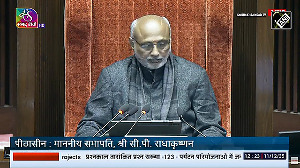The completely avoidable mess that the finance ministry found itself in was rather surprising, says Debashis Basu.
 While presenting the Union Budget for 2016-17, Finance Minister Arun Jaitley announced "measures for moving towards a pensioned society."
While presenting the Union Budget for 2016-17, Finance Minister Arun Jaitley announced "measures for moving towards a pensioned society."
Towards this goal, he proposed that 60 per cent of the corpus created by new contributions to recognised provident funds would be taxed, if it is not re-invested in an annuity product.
This has created a tremendous backlash from the target group of some seven million employee provident fund members in the private sector.
A panicked government started issuing contradictory clarifications, but by the weekend, nothing was clear. On Sunday, a leading newspaper speculated that Prime Minister Narendra Modi has asked the FM to hold back this Budget proposal.
Citizens are used to governments bumbling on issues and events that unfold very quickly. But a Budget is prepared over months.
Making a significant change in the way provident fund is treated for tax is a long-term step.
It is supposed to be a well-thought out one. Hence, the completely avoidable mess that the finance ministry found itself in was rather surprising.
All that the government needed to do was to take a simple step: put out a discussion paper which contained facts, explained the government's thinking about the future and solicited feedback from domain experts, which would have thrown up all the flaws in its thinking, and then formulated a workable policy.
In this case, it is unclear what is the thought process behind taxing 60 per cent of the PF corpus of private sector employees earning above a certain income level, unless they put it into annuity products.
The government has apparently tried to do two things: one, put EPF and National Pension System (NPS) at par, and two, ensure that employees in the organised sector (earning above Rs 15,000 a month) get forced "pension security".
While the government's move meets the first objective, what about the second? As it is, just before the budget the government dropped a bombshell that total PF corpus can be withdrawn at 58 not 55, and before that only the employee contribution can be withdrawn, not that of the employer.
The FM's move to create a "pensioned society" by forcing 60 per cent of the EPF corpus into annuity is rather simplistic.
Retirement planning is a complicated exercise for most people, especially private sector employees.
It is also one of the least researched aspects of investment planning. It is easier for a 30-year-old to invest her money for long-term savings.
It is devilishly difficult for the same person to plan her finances when she is 58. Savers have to deal with many issues, some of which are:
Where to investment the retirement corpus?
What is the expected return from the corpus?
What are the tax implications?
How much should be their monthly expense?
How long would the corpus last?
How much/when to withdraw from the principal?
Each person's situation is different. Some will have a post-retirement income/support either in the form of pension, or support from their children, family wealth or another job, while others will not.
Some will enjoy good health; others may have to spend heavily on medical expenses.
It requires complex calculations and careful assumptions, which should lead to customised solutions.
Is it the government's job to jump into this and create dissonance, especially since the revenue secretary says that the government has nothing to gain from it?
The government wants to save the savers from themselves. But even such a noble objective must be based on data.
But does the finance ministry have any data that shows that a majority of those saving through a recognised provident fund were blowing up all their tax-free money when they got their EPF corpus?
Has there been a survey that proves that savers do not know what to do with their money?
In contrast, do we know how many savers currently growing their corpus through the EPF will now feel trapped into buying annuities which are poor investment products?
Do we know how many people have used a part of the EPF money for their children's marriages, buying a home or other emergencies and cannot do so now?
Finally, has the government examined the business of annuities before forcing senior citizens into it?
Annuities are a simple information and access arbitrage enjoyed by insurance companies to rip off senior citizens. Insurers buy long-dated governments securities at eight plus per cent and hand down five-seven per cent pretax return to the annuity buyers, keeping the profits.
So, annuities work only because savers do not have access to 20-30 year government securities, which insurance companies have.
There aren't too many annuity sellers either. The finance ministry should have first made long-dated government securities available to savers, like the tax-free bonds from government and quasi-governments entities.
But that is just a part of the much-needed and exhaustive reform of retirement products.
The bigger lesson from the mess of EPF tax is this. It should be a standard government practice to first establish with data and surveys the reasons for any new policy measure, put this out as a discussion paper and then take a decision.
If not, the government will bumble from one impressionistic measure to another, getting an unnecessary bad name for itself, even assuming that it means well.
The writer is the editor of www.moneylife.in






